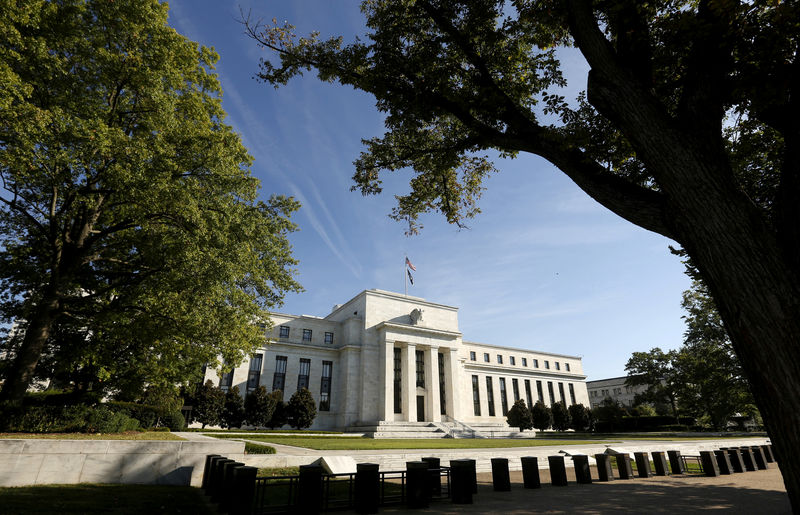By Pete Schroeder
WASHINGTON (Reuters) - The U.S. Federal Reserve unveiled a proposal on Wednesday that would ease regulations for banks with less than $700 billion (548.4 billion pounds) in assets, as the central bank looks to tailor rules in line with banks' risk profiles.
PNC Financial Corp (N:PNC), Capital One Financial Corp (N:COF), Charles Schwab (N:SCHW), and U.S. Bancorp (N:USB) would enjoy reduced liquidity and compliance requirements under the proposal, which the Fed board approved on Wednesday. Several smaller banks would see further reduced regulation as the Fed implements changes ordered in a bank deregulation law Congress passed in May.
The proposal establishes four tiers of regulation for banks with over $100 billion in assets, as the central bank seeks to tailor rules for larger firms. The proposal would reserve the strictest rules for U.S. globally systemic banks, and step down requirements for smaller and less complex firms.
The law rewriting portions of the 2010 Dodd-Frank financial reform law directed the Fed to trim regulations for banks with less than $250 billion in assets, and also gave the central bank discretion to further modify rules for larger banks as it saw fit. Wednesday's proposal goes beyond the $250 billion threshold authorized by Congress, as it aims to provide relief to all but the nation's nine largest banks.
According to the proposal, banks with between $250 billion and $700 billion in assets could enjoy a reduced "liquidity coverage ratio," which requires banks to hold high-quality assets that could easily be turned into cash. The Fed estimated the proposal could reduce that ratio by as much as 30 percent for those firms.
Smaller banks would be subjected to less frequent "stress tests" of their capital plans by the Fed, and face even less restrictive liquidity and capital requirements.
Randal Quarles, the Fed's vice chair for supervision, said the changes should "meaningfully" reduce compliance costs for banks without injecting significant new risk into the banking system.
"These proposals embody an important principle: the character of regulation should match the character of a firm," he said.
However, Fed Governor Lael Brainard voted against the proposal, arguing it went beyond Congress's intent and exposed the financial system to unnecessary risk by easing rules on larger banks. She was the only one of the four current Fed board members to oppose the plan, which now goes forward for public comment.
The proposal reserves the strictest rules for the nation's largest global banks, and also keeps tougher rules for Northern Trust (O:NTRS), as the Fed said banks with over $75 billion in cross-border activity should continue to face stricter rules.
The annual requirement that the Fed conduct stress tests and evaluate bank capital plans would drop to every other year for 11 banks with between $100 billion and $250 billion in total assets. Those banks also would be exempted completely from the liquidity coverage ratio and instead would be subjected to "tailored" liquidity risk management.
Quarles said Wednesday he expects the Fed to quickly move to treat the 2019 stress test cycle as the second year of the proposed two-year cycle. If the Fed adopts that change, banks with less than $250 billion would not post public stress test results until the 2020 cycle.
The proposal also gives the Fed flexibility to reimpose stricter rules on banks below $700 billion in assets if they engage in higher levels of riskier activity. Banks with over $75 billion in nonbank assets, weighted short-term wholesale funding or off-balance sheet exposure would face tougher oversight than similarly sized competitors.

The proposal does not address foreign banks or their U.S. operations. The Fed said it intends to propose a separate rule for those firms "in the near future." The Fed also said it was working with the Federal Deposit Insurance Corporation on a proposal to tailor "living will" requirements for banks, but did not offer a timeframe for when that proposal could be made public.